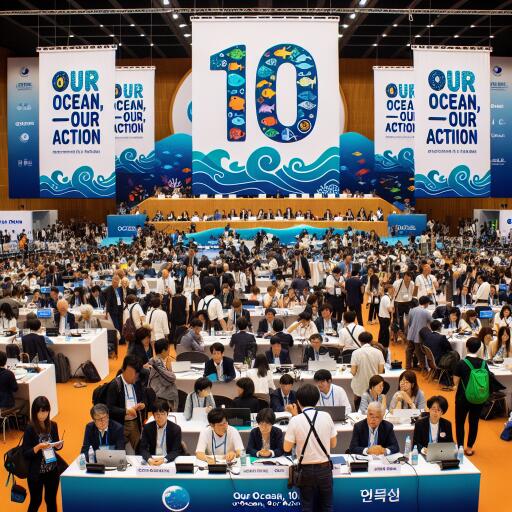
Our Ocean, Our Action: The 10th Our Ocean Conference Opens in Busan, Korea
Busan, Korea – The 10th Our Ocean Conference (OOC) opens today at BEXCO in Busan, Republic of Korea, gathering international leaders, policymakers, stakeholders, scientists, indigenous advocates, young leaders, and civil society under the theme “Our Ocean, Our Action.” This decade anniversary event aims to evaluate progress, replicate successful strategies, and ignite new commitments towards ocean conservation.
Do-hyung Kang, Korea’s Minister of Oceans and Fisheries, emphasizes that this year’s conference will spotlight the achievements and success stories of the past decade while setting the vision for international cooperation in the years to come. According to Kang, “The conference is poised to be a significant moment for international collaboration, laying a crucial foundation for our collective efforts towards a shared future.”
Covering over 70% of the planet, the ocean is vital for sustaining life on Earth. It supports global agricultural systems, fuels the blue economy, and regulates the climate by absorbing over 90% of the excess heat trapped by greenhouse gases. The Our Ocean Conference has established itself as the leading platform for impactful, voluntary ocean initiatives, with over 2,600 commitments made so far. This forum calls for accelerated advancements, aiming to include more regions and voices, particularly in South Asia, Africa, Latin America, and the Middle East, in the global ocean agenda.
The 2025 conference marks a historical first by presenting an in-depth analysis of the pledges made since the conference’s inception. The World Resources Institute’s (WRI) research indicates that out of the $160 billion pledged through the OOC, more than $133 billion has been either allocated or is in the process of being delivered. These funds are directed towards initiatives combating illegal fishing and preserving marine biodiversity, with a significant portion supporting ocean-climate projects that leverage ocean-based solutions to mitigate emissions and adapt to climate change.
Notably, Korea has recently ratified essential treaties like the High Seas Treaty, becoming the twenty-first country to do so, and established new marine protected areas (MPAs). Approximately half of the globally recognized MPAs were initially declared at the OOC, underscoring the conference’s influence in marine conservation efforts.
Ocean-based solutions have the potential to provide up to 35 percent of the emissions reductions necessary by 2050 to meet climate targets, contingent upon adequate funding. This underscores the need for a $2 trillion investment over the next two decades to unlock this potential.
The positive momentum from Busan is expected to carry forward to the UN Ocean Conference in Nice later this June, with growing optimism regarding the treaty’s enactment, even though it requires ratification by an additional 60 countries to take effect.
Highlighting the urgency, Tom Pickerell, Global Director of the World Resources Institute Ocean Program, remarks that multilateral cooperation has been shown to be viable, and it must now expand with increased ambition, speed, and scale. “The health of our ocean transcends environmental concerns and bears significant implications for human health, economic stability, and global security. The choices we make today will determine if our ocean can continue to sustain us in the future,” Pickrell stated.





Leave a Reply